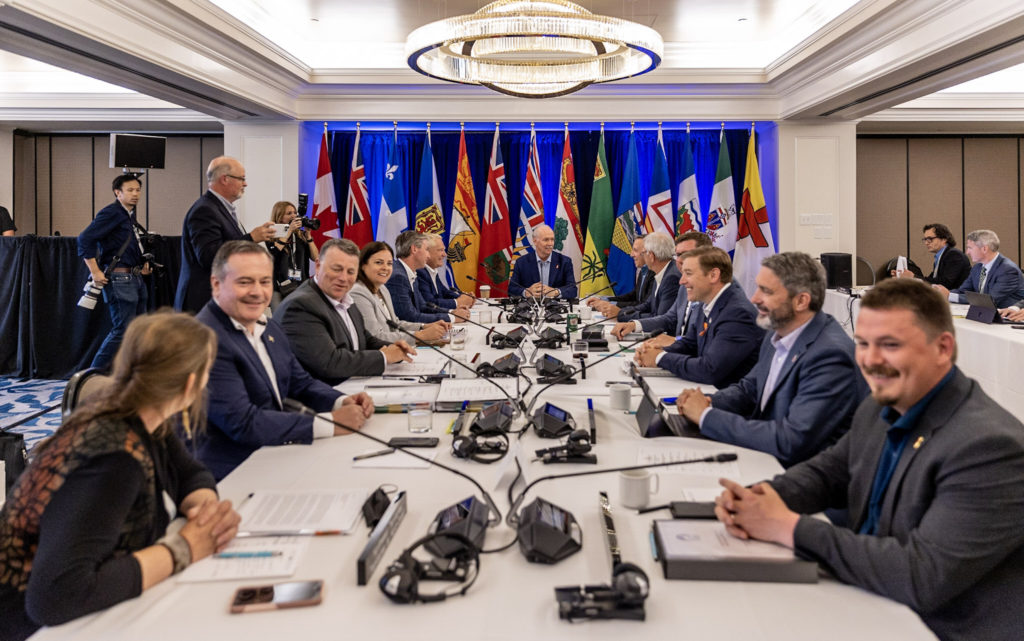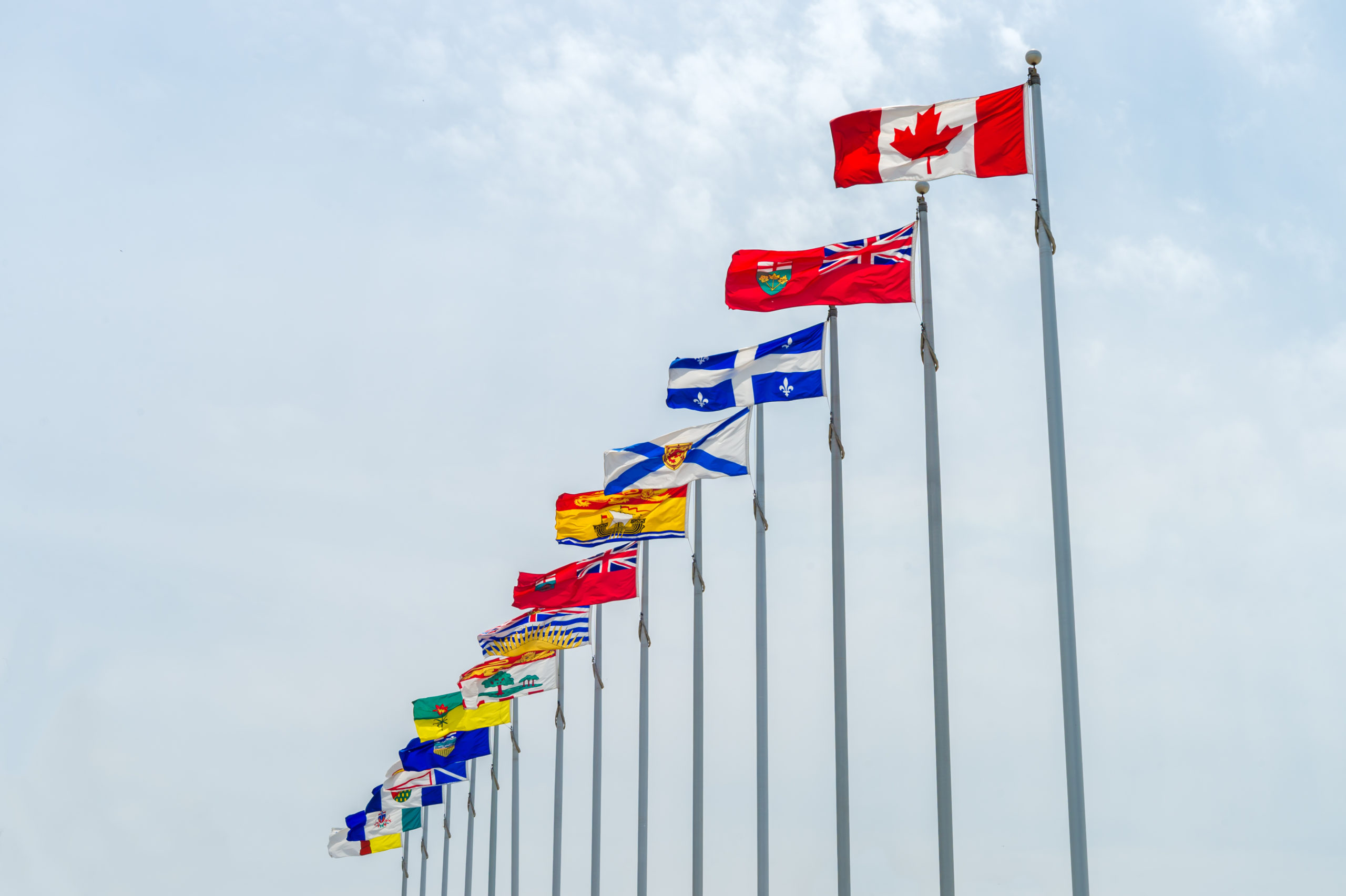Council of the Federation (COF) summer meetings in Victoria focus on health transfers, affordability, immigration, and economic recovery, while the federal government indicates a deal on health funding could be reached in the coming months.
The Council of the Federation held its 2022 Summer Meeting of Canada’s Premiers on July 11 and 12 in Victoria, chaired by British Columbia Premier John Horgan.
The Council of the Federation, comprised of all 13 provincial and territorial premiers, has a stated purpose to enable premiers to “work collaboratively, form closer ties, foster constructive relationships among government, and show leadership on important issues to Canadians.
In his role as chair, B.C. Premier John Horgan has been strongly advocating for an increase to federal health transfers. The formal COF agenda reflected this priority, as discussions were heavily centered around “the urgent need to resolve the funding shortfall facing Canada’s health care systems,” which Québec Premier François Legault called the most important problem facing Canada. Affordability issues, economic recovery, interprovincial trade barriers, labour shortages, and immigration were also on the agenda.

Dominic LeBlanc, federal minister of intergovernmental affairs said on CBC News that he spoke to Premier Horgan just prior to the gathering. Minister LeBlanc noted the federal government had expectations of provinces to come to the table with their own spending commitments on health care. He expressed disappointment in some provinces who collected COVID funds and posted surpluses, or sent cheques to residents. However, LeBlanc was optimistic an agreement could be reached in the coming months, and said the federal government is prepared to provide additional funding, but with conditions attached to outcomes.
Federal Minister of Health Jean-Yves Duclos said Wednesday on Power and Politics that provincial health ministers need to gather to discuss health outcomes before the prime minister meets with premiers to discuss funding. The premiers quickly refuted this assertion, expressing disappointment at the prospect of this important topic being handled by anyone other than the prime minister and the 13 premiers.
In an energetic closing press conference, the premiers repeatedly expressed frustration that the federal government appeared to be communicating with them through the media and called on Prime Minister Trudeau to sit down with them for discussions as soon as possible to be an “equal partner” in health care.
The response to conditions among provincial leaders is mixed, but the group firmly asserted that each of them is committed to improving health outcomes and results. Premiers pointed out health care needs vary greatly by province – for example, provinces with older populations might require more support for long-term care than a province with a younger population. The premiers reiterated a call for flexibility to address respective provinces’ concerns, reinforcing that the federal government must be at the table to actually hear these concerns, and Ottawa has been unresponsive to date.
Premier Horgan said the federal government promised eight months ago it would sit down with provinces and find a way forward with regard to funding public health care, and the provinces are still waiting. He pointed to successful collaboration during the height of the pandemic – where the prime minister and premiers met 36 times – as an example of productive cooperative efforts. Horgan repeated his call for sustainable, predictable, long-term health care funding several times during media availabilities over the course of the meetings.

Going into the meetings, premiers Scott Moe and Doug Ford indicated more control over immigration was a key issue for their provinces. Premier Kenney pushed his counterparts to address interprovincial trade barriers.
The meeting concluded with the release of two official COF communiqués: one addressing health care sustainability; and the other addressing affordability and global challenges, including labour supply, energy security, and climate change. In the former, the premiers reiterated “their unanimous call for the federal government to increase its share of provincial-territorial health care costs from 22 per cent to 35 per cent through the Canada Health Transfer (CHT).”
Premiers also communicated the work of their governments to deliver “health care, skills training, settlement services, climate action, and resource development that are critical to Canada’s future,” and urged the federal government to “act in partnership to support this work while respecting provincial and territorial jurisdiction.”
A meeting with national Indigenous leaders and premiers was held on Monday morning in advance of the formal COF agenda. The leaders discussed challenges dealing with the Indian Act, the importance of UNDRIP and progress on reconciliation, and the passage of the Declaration Act and corresponding action plan in B.C. as an example that could be followed in other provinces.
This was the first time in over two years COF meetings were held in person.
Meeting participants
- Premier John Horgan, British Columbia – Chair
- Premier Heather Stefanson, Manitoba – Vice-Chair
- Premier Doug Ford, Ontario
- Premier François Legault, Québec
- Premier Tim Houston, Nova Scotia
- Premier Blaine Higgs, New Brunswick
- Premier Dennis King, Prince Edward Island
- Premier Scott Moe, Saskatchewan
- Premier Jason Kenney, Alberta
- Premier Andrew Furey, Newfoundland and Labrador
- Premier Caroline Cochrane, Northwest Territories
- Premier Sandy Silver, Yukon
- Premier P.J. Akeeagok, Nunavut
